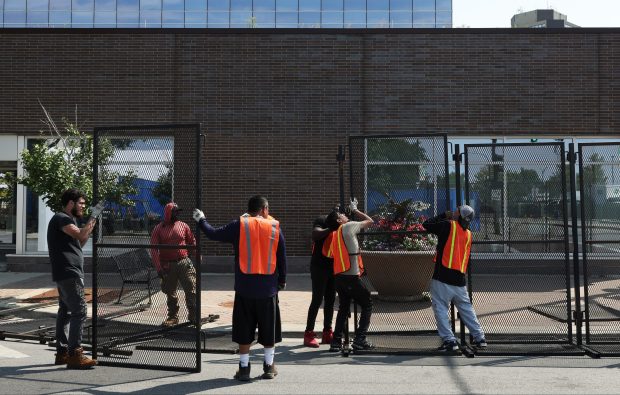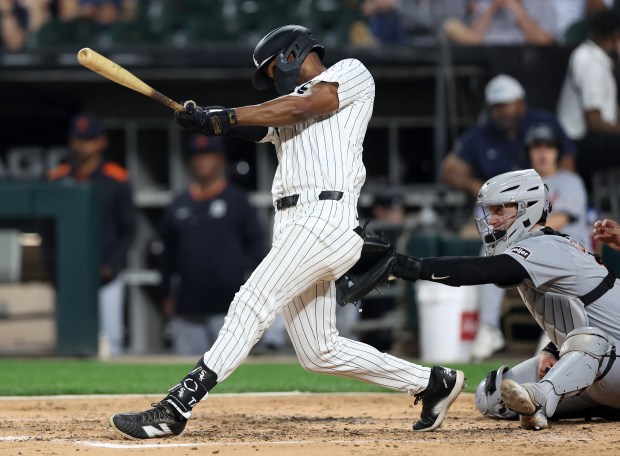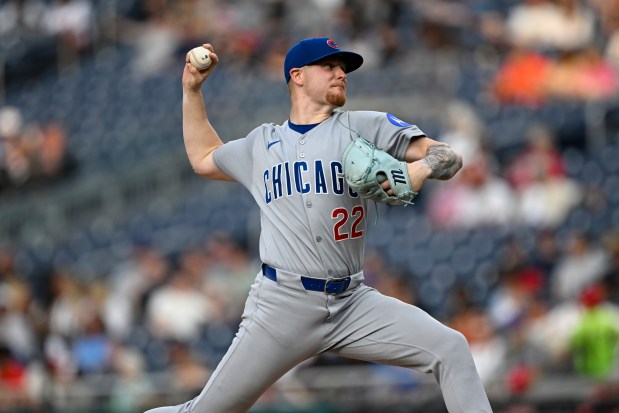Residents of Chicago’s South and West sides make up only 20% of the construction workforce for the Democratic National Convention, the convention’s organizers revealed this week, even after extensive efforts to diversify and engage with underserved neighborhoods.
In total, 46% of construction workers hired for the convention are from Chicagoland, with the majority coming from the North Side of the city and its suburbs, according to the DNC host committee.
The committee encouraged all of their contractors to ensure that their workforce was diverse and representative of Chicago, said senior adviser Keiana Barrett. However, they chose to not set any specific numerical benchmarks.
“What we did was spend more time focused on process than actually on percentages,” Barrett said. “There was a very robust engagement strategy to ensure that we were not only moving the needle, but making some very significant economic impacts for communities of color on the South and West sides of Chicago.”
Ald. Walter Burnett Jr., 27th, said that the convention’s organizers overall failed to meaningfully reach workers from the Near West Side where the key evening events of the convention will take place at the United Center.
Local residents and businesses had hoped that the DNC would bring an economic windfall. Particularly to the west of the convention venue, the neighborhood has historically faced a lack of investment, leading to poor housing conditions and limited economic opportunities.
Burnett said the host committee rejected his plan to create a neighborhood-specific outreach team for the Near West Side; now, he does not personally know anyone in his ward who has been hired as construction labor for the convention.
“I was trying to work with them on doing a specific hiring program for the community, having a job fair for the community, and it didn’t happen,” Burnett said. “They wanted to do the whole city instead of just doing the community. And I thought that was unfair, because they’re in the community, and right now the community has to live with all of the inconveniences that go on.”
The DNC host committee has held workforce and contractor recruitment events in and around the United Center, including a contracting outreach event at Malcolm X College on the Near West Side.
Additionally, a spokesperson for the DNC host committee said they are currently in the process of finalizing a contract with a West Side-based workforce development firm to source more local personnel for post-convention labor, as the venues are restored to their original condition.
Local labor and business leaders said that the DNC host committee and its chosen prime contractors did take the time to connect with many Black and Latino communities on the South and West sides. Additionally, they noted that many of the key businesses involved in the convention are run by entrepreneurs of color from the south and west of the city, including the exposition services prime contractor Show Strategy.
Yet the still-limited representation of these neighborhoods in the construction workforce may reflect endemic problems in terms of equitable employment opportunities in the city.
“We have to do more to get people interested in going into certain industries, that’s the paramount thing,” said Cornel Darden Jr., chairman of the Greater Chicagoland Black Chamber of Commerce. “As a kid, if you don’t know that a job even exists, that it’s even a possibility, then the chance of you taking on such a job would be slim to none.”
Wearing hard hats covered in union stickers, a team of carpenters put up wooden boards on Friday outside of the United Center to support a large mural of Democratic presidential nominee Kamala Harris.
It was the third week of nonstop work at the United Center for 48-year-old carpenter Emmitt Wright, who had responded to a labor call for the DNC. With the convention just three days away, his team was still hard at work putting finishing touches on the site.
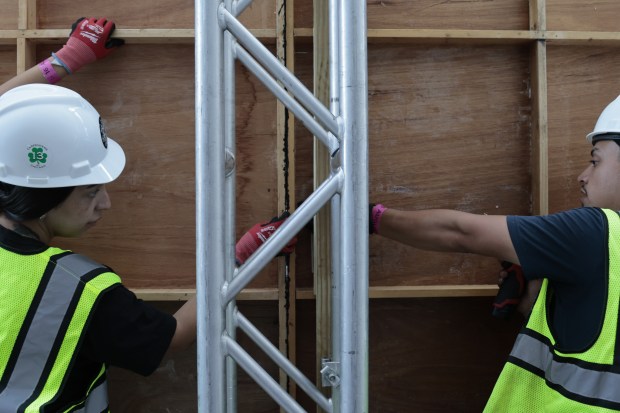
Wright grew up on the West Side, near Cicero. His uncle helped him join a carpenters union in 1999, and he’d been in the profession ever since.
“I was born with a hammer,” Wright said, as golf carts carrying convention volunteers whizzed by. “What I do is not work. I love it.”
With him on the crew on Friday were Danny Morales and Jaclyn Ramirez, two carpenters from the Bridgeport neighborhood. Growing up in a blue collar area, Morales and Ramirez said they both felt encouraged to go into the trades after watching friends and family take similar jobs.
When called by prime contractors for the DNC to assist in workforce development, unions such as the Mid-America Carpenters Regional Council did not have to look far to find diverse crews of workers to offer up for the convention, communications director Phil Davidson said.
Their union has people that “come from every neighborhood in Chicago,” including the South and West sides. Wright, Morales and Ramirez are all members.
Yet Davidson said that major barriers still exist for people from under-resourced neighborhoods in Chicago entering the trades, including transportation.
Their union’s nine-week pre-apprenticeship program requires participants to show up every day at 6 a.m. to one of two training centers.
“If you don’t have reliable transportation, it’s hard to make that work,” Davidson said.
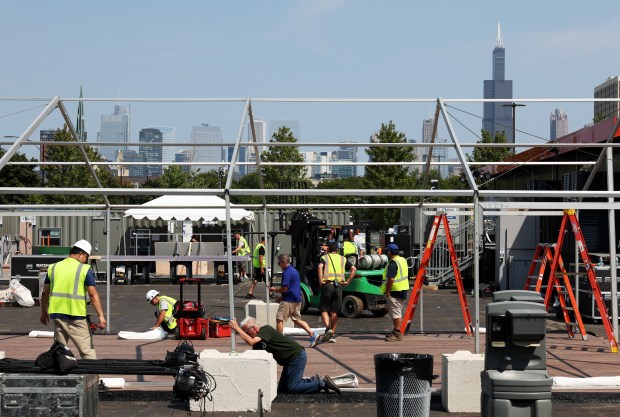
The prime construction contractor for the DNC is McHugh-Powers UC, a joint venture between McHugh Construction and local Black-owned business Powers & Sons Construction Co. However, carpenters and construction workers were also hired by other prime contractors, including event management company Show Strategy.
Glenn Charles Jr, a Black entrepreneur from Englewood who runs Show Strategy, said that his own workforce’s South and West side representation was “for sure” significantly over 20%.
Both McHugh-Powers and Show Strategy ran internship programs to engage young people from across the city to work on the convention, with McHugh-Powers offering a program specifically for minority students at Chicago community colleges. They also partnered with numerous unions and local organizations to conduct outreach to workers from underrepresented communities.
President of McHugh Construction Kinjal Patel said that they had engaged an extensive local network of minority-owned subcontractors for the DNC and kept a “strong emphasis on diverse hiring practices.”
“I think overall, if anybody came on site, you see a very diverse group, a labor workforce that represents all the various communities from around the city.” Charles said.
In the end, the DNC hired construction workers from two-thirds of Chicago’s ZIP codes. However, South and West side residents combined made up only two-fifths of their Chicago-based workforce and one-fifth of total labor.
Changing the composition of the construction workforce is a “large ship to turn” and will take time, said Pamyla Brown, community and citizenship director for Lakeside Alliance, a coalition of Black-owned construction firms.
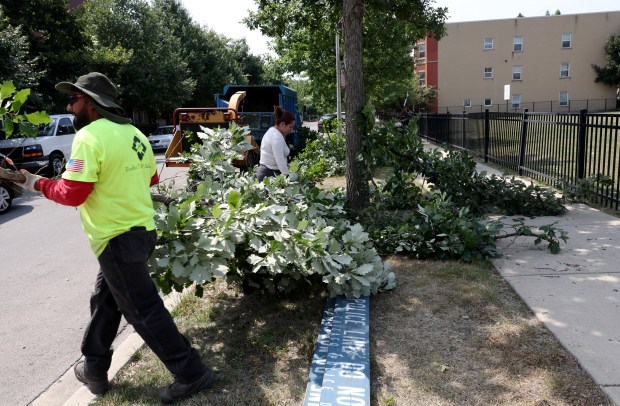
The Lakeside Alliance is currently building the Obama Presidential Center on the South Side. As of the end of 2023, 38% of total hours of construction labor on the presidential center were worked by people from the South and West sides. This accounts for almost three-quarters of the labor delegated to any Chicago residents.
Brown said that the DNC construction workforce’s 20% South and West side composition is still a major sign of progress, especially on such a large project with a short timeframe.
“I’m hoping that the attention being given to all the great work that the team did with the DNC and the work that we’re doing at Lakeside Alliance and the Obama Presidential Center, these will continue to spark those much needed conversations so that we can start seeing more generations of folks living on the West and South sides of the city of Chicago to go into these very lucrative and life-changing careers,” Brown said.
A spokesperson for McHugh said that the company has long been active in projects on the South and West sides, so was able to “lean heavily on existing relationships.”
McHugh-Powers collaborated with a number of groups dedicated to training and sourcing workers from underrepresented communities, including minority workforce development organization HIRE360.
HIRE360 was also able to bring recent Chicago Public Schools graduates from their pre-apprenticeship cohort to tour the DNC construction site, said Executive Director Jay Rowell.
The current workforce participation from the South and West sides represents a “really solid effort,” Rowell said. However, he added that much more work needed to be done to recruit individuals from disadvantaged neighborhoods for the trades, so that a more diverse workforce is available for Chicago’s future construction projects.
“I think it’s really important that the individuals who live in every neighborhood of Chicago should participate on construction teams in the city that they call home, and that’s been a real focus of our partnership,” Rowell said.
The DNC host committee also reached out “early and often” to the Greater Chicagoland Black Chamber of Commerce and many other key Black trade organizations, including them throughout the workforce and contractor recruitment process, Darden said.
Darden added that the DNC overall did a “phenomenal” job promoting diversity and inclusion among their contractors, and that there were “no hard feelings” from his organization regarding the 20% participation of South and West side construction workers.
“We should always strive to do better, right? I know sometimes we fall short,” Darden said. “We saw the effort, and we felt like we were a partner and we had every opportunity to participate.”


